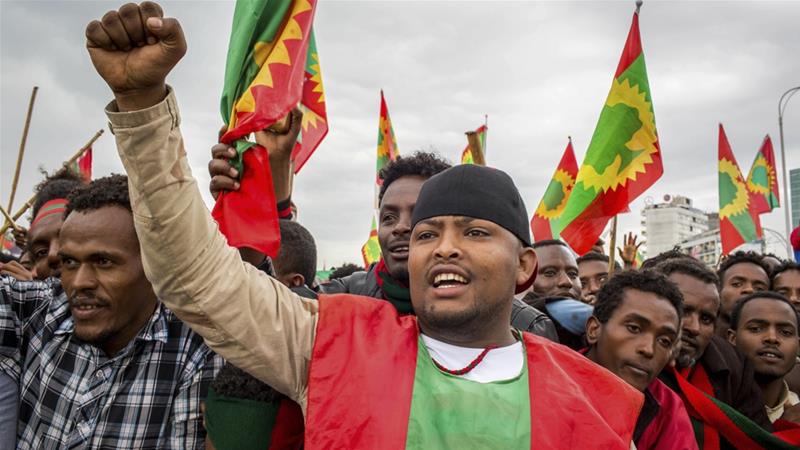Thousands of Ethiopians hail the return of once-banned Oromo group

Supporters celebrate in Addis Ababa as the leadership of the Oromo Liberation Front returns from exile.

![]()
Hundreds of thousands of people have gathered in Ethiopia’s capital to welcome leaders of the Oromo Liberation Front (OLF), the latest members of a formerly-banned rebel group to return home following a string of political reforms in the country.
The jubilant crowd waving OLF flags gathered at Addis Ababa’s Meskel Square on Saturday, where a large concert was held to welcome the group’s leader Dawud Ibsa and others, while similar events were held in Ethiopia’s Oromia region.
“I am happy to be here after 26 years of struggle from outside of Ethiopia,” Ibsa said. “We will be a part of the peaceful struggle,” he added.
“We have been struggling to bring the changes that we are seeing now in Ethiopia. We are now seeing positive signs that include the respect for rule of law. That’s why we came here,” said Ibsa.
Earlier on Saturday, nearly 1,500 OLF fighters returned from neighbouring Eritrea.
Prime Minister Abiy Ahmed – who, in April, the first Oromo to hold the post – has introduced a number of reforms since assuming office, as well as overseen the release of jailed dissidents, the unblocking of websites and moves to liberalise the economy.
Long exile
The OLF was founded as a political organization in 1973 to advocate the “right to national self-determination” for the Oromo people, Ethiopia’s largest ethnic group, against what they perceived as the “Abyssinian colonial rule”.
The group had a fallout with the ruling Ethiopian People’s Revolutionary Democratic Front (EPRDF) in 1992 and soon began launching armed attacks.
In response, the government banned it and later declared it a terrorist organisation.
The crackdown on OLF deepened resentment among Oromos, whose months of anti-government protests, which also spread to the Amhara region, led to the resignation of former Prime Minister Hailemarian Desalegn earlier this year and his replacement by Abiy.
‘Freedom’
In July, the ban on OLF and two other groups were lifted as part of the prime minister’s efforts to bring back various opposition groups into the Ethiopian politics.
Speaking to Al Jazeera from Addis Ababa, Jawar Mohammed, executive director at Oromia Media Network, called the return of the OLF leadership “a historic day in their nearly 50-year-old struggle”.
“We are in a positive transition now. This day is a significant milestone in Ethiopia’s transition to democracy,” he said, adding that the Oromos have a “vested interest” in keeping the country together.
“It paves the way for a peaceful election within the next two years,” he said.
Several people in the crowd at Meskel Square bore scars incurred during years of Oromo-led anti-government protests.
“I never thought this day would come,” said 27-year-old Arfase Elias, showing the scar from a bullet that hit her left leg 12 years ago during a demonstration in the restive town of Ambo.
“For this flag, I have seen my brothers tortured, dying on the streets. I have seen the sacrifices they had made for freedom,” she said.
Analysts say that with the return of Ibsa, the last bastion of armed struggle in Ethiopia has come to an end.